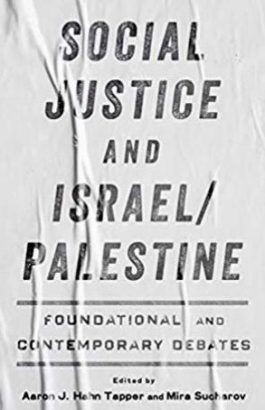In the introduction to Social Justice and Israel/Palestine, Aaron J. Hahn Tapper and Mira Sucharov reflect on their pedagogic principles and purposes in presenting this original and powerful book:
The Israeli-Palestinian conflict is all too often taught and studied through an international and explanatory lens: what happened and why? Although the reasons behind this approach are sound, it is equally important to examine ways in which the what, how, and why behind this seemingly intractable conflict can — and will — lead to its ultimate end. By examining the Israel-Palestinian relationship through the lens of social justice, an interdisciplinary perspective that places concepts such as rights, justice, and oppression at the forefront, this book aims to de-exceptionalise this ostensibly exceptional conflict, empowering readers to understand ways to end the suffering and injustice that plague those living in Israel/Palestine and beyond. [xi]
Tapper and Sucharov assert that while many scholars ‘have sought to metaphorically barricade their conversations against the seeping in of politics and activism (despite the fact that, by definition, this is not possible) … we aim to counter an avoidance approach’. This collection of essays widens the discourse on the reasons for the conflict and on the issues that must be addressed to end it, but intriguingly acknowledges that readers may be more likely to ‘question answers’ than to find their questions actually answered.
Before raising some of the anticipated questions, it is worth recognising what this volume gets right. The book’s organising principle is debates — about the past or pasts, about identity, about sources of oppression and pathways to liberation and freedom. Debates have carried the Israeli-Palestinian conflict to this moment where there are as many daily reminders across university campuses as on the battlefields in the Middle East. What was once a focus for scholarly interrogation is typically more often a reason for demonstrations today.
Social Justice and Israel/Palestine is an important source for understanding the range of thinking that shapes the contemporary discourse on the Israeli-Palestinian conflict. The editors have brought together in dialogue scholars whose books and articles appear on the syllabi for courses on this contentious topic with people whose actions have created powerful alliances in support of the Palestinian cause.
The book achieves some of the objectives Tapper and Sucharov set out for it. One need not accept the editors’ insistence on the impossibility of preventing politics from infecting analyses to appreciate the elegance of the dialogue they have created in these pages. On each of the topics, contributors have written essays that reflect their own particular perspectives and have commented on how their own views intersect with those offered by others. The exchanges test the flexibility of the vocabulary used to define the conflict while exposing some of the disparities in strategies and objectives. The juxtaposition is intended to move academicians as well as advocates away from their self-reinforcing intellectual or political bubbles by asking contributors to confront views radically different from their own.
There is evidence — certainly in the first section on narratives — of a dynamic at work, opening up outlooks. Alan Dowty accepts the idea of incorporating conflicting narratives. In the same section George Bisharat explores the many narratives of the past that challenge the idea of perpetual conflict between Jews and Arabs in Palestine. However, on topics like self-determination, settler-colonialism, and international law, the gulf between those who see a battle between two nationalisms for the same land and those who assign Israel to the category of regimes committing war crimes seems to this reader unbridgeable.
Consider the discussions of international law where Michael Lynk argues that invoking legal principles will ‘greatly improve bargaining dynamics’ by levelling ‘the playing field’ between Israel and the Palestine Liberation Organisation (PLO) [p. 97]. Or ponder Lisa Hajjar’s charges against Israel as a serial transgressor of international humanitarian law in its use of violence against Palestinians. An international law, applied to only one case and country, is a political instrument, not a neutral legal principle in Miriam Elman’s words. Elman draws radically different conclusions about Israel’s deployment of force by giving a fuller explanation of the reasons for the lethal actions undertaken by the country’s army — the ones cited by Hajjar as criminal — and why they are an important line of defence.
Or mull over the differences in assessments offered by Sam Fleischacker, and by As’ad Ghanem and Tariq Khateeb that essentially turn on whether or not Zionism is an authentic expression of Jewish nationalism or simply an artifact of colonialism. Events can be amplified in a way to convince people to think in a particular direction. The same may be said of accords struck across borders, such as the Black-Palestinian Alliance. It is a kinship forged long before the intersectionality rubric was invented but one that has triggered resistance from progressives more comfortable with separating the problems besetting African Americans and those confronting Palestinians. Another striking example of imagining people moving beyond traditional lines of hostilities to generate new possibilities for peace can be found in Aziza Khazzoom’s moving essay where she describes the culture shared by Israeli Jews who emigrated from countries in the Middle Eastern and by Palestinians. Despite a common language or even a set of similar experiences, there is little evidence that they form the basis of a collaborative political agenda.
The volume’s academic jargon, often difficult for the non-expert to penetrate, is explicated in plain language summaries that highlight what makes a particular essay unique, why it touches on something important about how the conflict is defined, and about what is demanded if it is to be fully resolved. For Palestinians, their conflict with Israel is not simply a fight for a state; it is also, if not primarily, a struggle for justice and self-determination. It is in this sense that to call this a conflict arising from contested claims by two nations over the same land not only misreads what is actually at stake; it also diminishes the scale of what must be done to compensate for the disaster that befell Palestinians in 1948 and presumably still haunts the region and the world.
1948 once carried enormous causal weight and symbolic significance as a metaphor for the political agony spread across the Middle East. But is it still considered a primary determinant for the suffering and dislocation that stalks politics in Arab lands? You see the reasons for this question in today’s maps of the Middle East where Syria is carved up into parts controlled by Russia, Iran, and Turkey. Or in reports of state failure in Libya and Iraq where dictators were overthrown and killed only to be replaced by chaos and brutality. In a region engulfed in civil wars, terrorism, and dictatorship, can the Israel-Palestinian conflict serve as the first and most pressing cause to penetrate the conscience?
Rejecting past conventional wisdom with its focus on the conflict as primarily a land dispute, according to many essays, means scrutinising inequality and injustice and above all, acknowledging how rooted they still are in colonialism, the historical monstrosity that apparently has still escaped a full moral accounting for its crimes. The striking fact about colonialism is it did not endure, nor did it deprive those oppressed by it of their capacity to dismantle its administrative force. That the Jewish state has retained if not strengthened its power and not followed the expected arc of historical decline is apparently proof, at least to many in this volume, that the country still draws nourishment from colonialism and the inevitable oppression following in its wake.
But branding Israel a colonial society has a catalytic effect on destroying the idea of a legitimate Jewish state whatever its borders. It delivers up a Jewish state in which neither political leaders nor particular policies matter. Such an intellectual formation not only runs counter to the idea of a negotiated arrangement so two peoples can share the land, provide open access to holy sites, and show a flexibility nourishing peace rather than inciting violence; it also repudiates the Oslo Accords, an agreement that not incidentally won the backing of Israel and of the officially recognised representative of the Palestinian people, the PLO. Here it is important to remember that for as long as there has been an Israeli-Palestinian conflict, proposals for ways to end it have focused on a geographic division of Palestine and on granting Jews and Palestinians sovereignty. Since the unravelling of the Oslo Accords, the call for two states for two peoples has lost, if not its voice, then certainly, its momentum. Still, it is hard to imagine any progress that begins by dislodging the only thus far agreed upon grounds for peace.
An honest reckoning with the introduction of moral reasoning into the discourse on the conflict must thus be willing to encounter a new set of questions. Does the social justice framework really lend clarity to a conflict that has already a well-earned reputation for complexity? Two states for two peoples reduces and simplifies the disputes to more manageable and concrete proportions while admittedly ignoring those that possess a different ambition that may be important but are, in fact, quite intangible and unreachable given what we know about the current distribution of power.
To return this review to where it began, few terms have had quite as problematic a status in politics as ‘justice’. Introducing the idea of social justice to the Israel-Palestinian conflict is more likely to have an unsettling than a reassuring impact. Both Palestinians and Israelis claim it as their own, even with little agreement on its meaning. Can Israelis and Palestinians be rescued from their confrontations with justice as their frame of reference? It doesn’t take a genius to see proposals wrapped around Palestinians as indigenous rejected by most Israelis or those evoking principles of international law or humanitarian rights taken as a sign of impending doom for a Jewish state whose borders and sovereignty deny entry to these global forces. The book may turn out to be more of an illustration of the reasons for the deadlock besetting the peace process than a resource for ideas that offer new and bold options for advancing peace.
Finally, while this collection depicts both how the conflict is imagined by many who live distant from its borders and captures the sense of urgency they feel, it is reasonable to ask how well it reflects what is actually happening on the ground — where Israelis and Palestinians interact and confront one another every day. Indeed, the vexed conflict between Arabs and Israel, Palestinians and Israelis, Muslims and Jews has also generated ways in which the populations have interacted and engaged with one another. The paradigm of conflict rests on a set of narratives, but it offers a striking contrast to the many accounts of peaceful and productive interactions that have been sustained and despite a vindictive polemics, become deeply anchored. Where all this will take the Israel-Palestinian conflict is difficult to say, but that it will take the conflict to new kinds of confrontations, and even soul-searching, is a certainty.
In the interest of full disclosure surprising no one, I should note that I am one of those scholars who believes it possible and not incidentally desirable to separate politics from analysis. Nor have the many creative ideas found in this book dampened my scepticism about how the notion of social justice might clarify or simplify what should or could be done about the Israel-Palestinian conflict. No less an authority than Aristotle noted the many definitions of justice because humans are quite diverse and possess quite different interests, all of which affect their perceptions of justice. Moreover, there are no recognised courts or institutions whose rulings are universally accepted. Nor has Israel shown much deference to the many condemnations of its policies coming from one or another agency of the UN. What social justice warriors view as progressive and moral, most Israelis see as threatening to obliterate the state that secures their lives, guarantees their freedom, and shapes their country’s policies for a better and brighter future for their children. However difficult to imagine, no resolution to the Israel-Palestinian question can be implemented without agreement from both peoples who may have entirely difference views of their conflict and hopefully, of ways to end it when they decide it is finally time to engage purposely and seriously with one another.
Donna Robinson Divine is Morningstar Family Professor of Jewish Studies and Professor of Government, Emerita, Smith College. Read a PDF version of this article here.




































